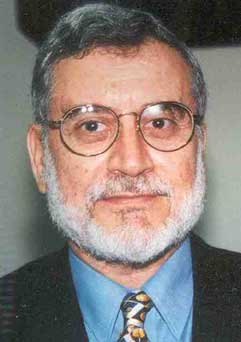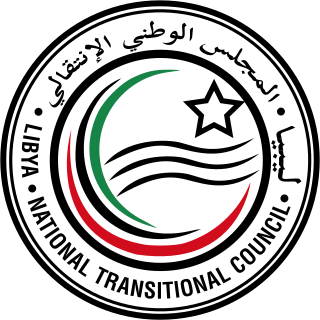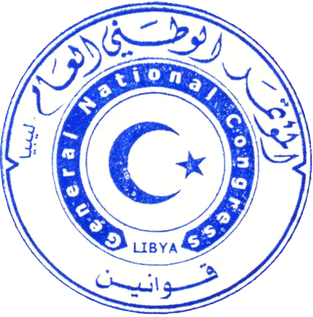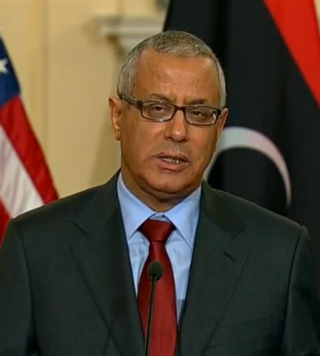
Libya's history involves its rich mix of ethnic groups, including the indigenous Berbers/Amazigh people. Amazigh have been present throughout the entire history of the country. For most of its history, Libya has been subjected to varying degrees of foreign control, from Europe, Asia, and Africa.

The politics of Libya has been in an uncertain state since the collapse of the Libyan Arab Jamahiriya in 2011 and a recent civil war and various jihadists and tribal elements controlling parts of the country.

Shukri Mohammed Ghanem was a Libyan politician who was the General Secretary of the General People's Committee of Libya from June 2003 until March 2006 when, in the first major government reshuffle in over a decade, he was replaced by his deputy, Baghdadi Mahmudi. Ghanem subsequently served as the Minister of Oil until 2011. On 29 April 2012, his body was found floating on the New Danube, Vienna.

Baghdadi Ali Mahmudi is a Libyan politician who was Secretary of the General People's Committee of Libya from 5 March 2006 to as late as 1 September 2011, when he acknowledged the collapse of the GPCO and the ascendance of the National Transitional Council as a result of the Libyan Civil War. He has a medical degree, specialising in obstetrics and gynecology, and had served as Deputy Prime Minister to Prime Minister Shukri Ghanem since 2003 at the time he was appointed to replace him. He was a part of Gaddafi's inner circle at least prior to his escape in mid-2011. He was arrested in Tunisia for illegal border entry and jailed for six months, although this was later overruled on appeal, however a Tunisian court decided to extradite Mahmoudi to Libya under a request from Libya's Transitional Council.

The Libyan–Sudanese relations refers to the long historical relations between Libya and Sudan, both are Arab countries.

The National Front for the Salvation of Libya (NFSL) was a political opposition group active during the rule of the Gaddafi regime in Libya. It was formed in 1981 and called for major liberalising reforms such as democratic elections, a free press, and the separation of powers. During the 1980s, it pursued a campaign of armed opposition to the Gaddafi regime and made several coup attempts, the most notable being its 1984 armed assault on Gaddafi's Bab al-Azizia compound in Tripoli. After the failure of this and several other coup attempts the group largely abandoned militancy, and instead used peaceful tactics to promote reform in Libya; in 2005, the NFSL joined with six other groups to form the National Conference for the Libyan Opposition.

The Libyan Investment Authority is a government-managed sovereign wealth fund and holding company headquartered in Tripoli, Libya. It was established on August 28, 2006, by Decree 208 of the General People's Committee of Libya (GPC), after the lifting of economic sanctions that had previously precluded foreign investment in Libya. The LIA oversees and manages investments in various areas including agriculture, real estate, infrastructure, oil and gas and in shares and bonds. It is Africa's largest sovereign wealth fund. The fund is a member of the International Forum of Sovereign Wealth Funds and is therefore signed up to the Santiago Principles on best practice in managing sovereign wealth funds. As of 2019, the date of its last valuation, the fund owns US$68 billion in assets.

Ibrahim Abdulaziz Sahad is the Secretary General of the National Front for the Salvation of Libya (NFSL).

The Libyan civil war, also known as the First Libyan Civil War, was an armed conflict in 2011 in the North African country of Libya that was fought between forces loyal to Colonel Muammar Gaddafi and rebel groups that were seeking to oust his government. The war was preceded by protests in Zawiya on 8 August 2009 and finally ignited by protests in Benghazi beginning on Tuesday 15 February 2011, which led to clashes with security forces who fired on the crowd. The protests escalated into a rebellion that spread across the country, with the forces opposing Gaddafi establishing an interim governing body, the National Transitional Council.

Mustafa Abdul Jalil is a Libyan politician who was the Chairman of the National Transitional Council from 5 March 2011 until its dissolution on 8 August 2012. This position meant he was de facto head of state during a transitional period after the fall of Muammar Gaddafi's government in the Libyan Civil War, and until the handover of power to the General National Congress.

The National Transitional Council (NTC) was a transitional government established in the 2011 Libyan civil war. The rebel forces overthrew the Libyan Arab Jamahiriya of Muammar Gaddafi. The NTC governed Libya for a period of ten months after the end of the war, holding elections to a General National Congress on 7 July 2012, and handing power to the newly elected assembly on 8 August.
The Libyan National Democratic Front was a Libyan political opposition organization. The organization was founded in the United States in August 1980, emerging out of the Democratic Libya Committee. The founding meeting elected a Central Committee and adopted the programmes of the organization. The organization coined the phrase "national democratic" which meant protecting the rights of the poor and middle classes, absolute national independence and democratic means of government. Some of its members had a Marxist ideological orientation. Compared to other Libyan opposition groups at the time, the Libyan National Democratic Front had a high degree of ideological and organizational consistency. The organization published the magazine al-Watan on a regular basis. The first issue of al-Watan was issued in September 1980.

The aftermath of the 2011 Libyan civil war has been characterized by marked change in the social and political order of Libya after the overthrow and killing of Muammar Gaddafi in the civil war that was fought in Libya in 2011. The country has been subject to ongoing proliferation of weapons, Islamist insurgencies, sectarian violence, and lawlessness, with spillovers affecting neighboring countries, including Mali.
The National Front Party is a political party in Libya, formed in May 2012. It is the successor to the National Front for the Salvation of Libya, an anti-Gaddafi resistance movement founded in 1981. Its ideology is considered liberal and progressive, and Libya Herald writer George Grant described the party as "arguably the most liberal-leaning of all in Congress."

The General National Congress or General National Council was the legislative authority of Libya for two years following the end of the First Libyan Civil War. It was elected by popular vote on 7 July 2012, and took power from the National Transitional Council on 8 August.

Ali Zeidan is a former prime minister of Libya. He was appointed by the General National Congress on 14 October 2012, and took office on 14 November after Congress approved his cabinet nominees. Prior to the Libyan Civil War, Zeidan was a Geneva-based human rights lawyer. According to the BBC, he is considered by some local observers as a strong-minded liberal. He was ousted by the parliament committee and fled from Libya on 14 March 2014. However, he told a press conference in Rabat, Morocco, that the ousting was invalid.

The Libyan House of Representatives is the legislature of Libya resulting from the 2014 Libyan parliamentary election, which had an 18% turnout. On 4 August 2014, in the course of the progressing August 2014 Islamist coup in the capital Tripoli in the context of the Libyan Civil War, the House of Representatives relocated itself to Tobruk in the far east of Libya. Several HoR sessions were held in Tripoli in May 2019 while Tripoli was under armed attack, electing an Interim Speaker for 45 days. Between 2014 and 2021, the House of Representatives supported the Tobruk-based government led by Abdullah al-Thani before supporting the incumbent Government of National Unity led by Abdul Hamid Dbeibeh. In September 2021, the House of Representatives passed a no-confidence motion against the interim GNU government and later appointed a rival Government of National Stability (GNS).

Fayez Mustafa al-Sarraj is a Libyan politician who served as the chairman of the Presidential Council of Libya and head of government of the Government of National Accord from 2016 to 2021, which was formed on 17 December 2015 under the Libyan Political Agreement. He has been a member of the Parliament of Tripoli.

The Government of National Accord was an interim government for Libya that was formed under the terms of the Libyan Political Agreement, a United Nations–led initiative, signed on 17 December 2015. The agreement was unanimously endorsed by the United Nations Security Council, which welcomed the formation of a Presidency Council for Libya and recognized the Government of National Accord as the sole legitimate executive authority in Libya. On 31 December 2015, Chairman of the Libyan House of Representatives, Aguila Saleh Issa declared his support for the Libyan Political Agreement. The General National Congress has criticized the GNA on multiple fronts as biased in favor of its rival parliament the House of Representatives.

Fathi Ali Abdul Salam Bashagha, known simply as "Fathi Bashagha" or occasionally Fathi Ali Pasha, is a Libyan politician and the former interim prime minister of Government of National Stability. He served as Minister of Interior from 2018 to 2021.

















